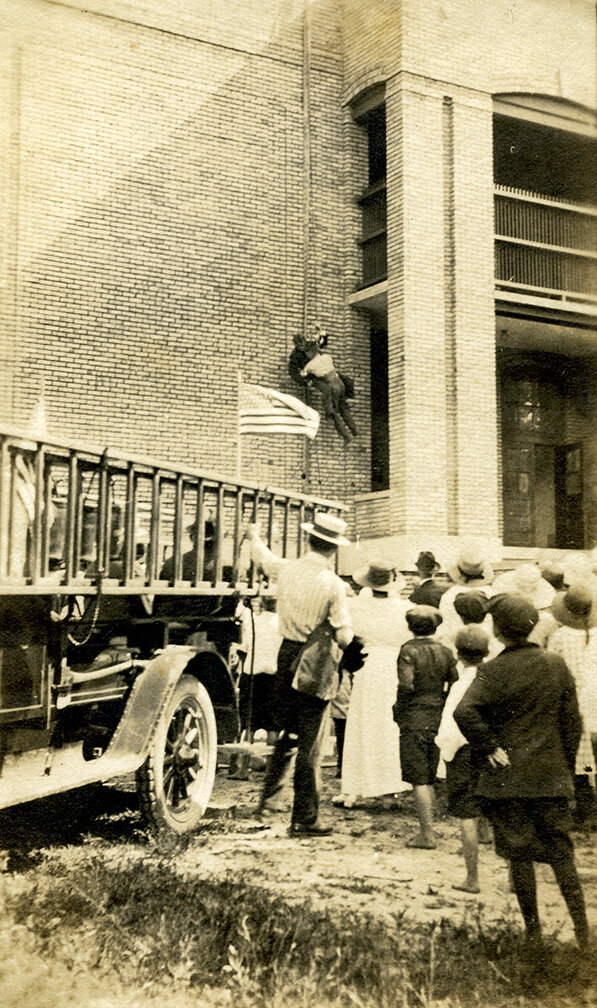Swannanoa Valley Museum & History Center to celebrate 100 years of historic firehouse
Exhibit to feature artifacts, photos and documents from Black Mountain Fire Department
The Valley Echo
July 5, 2021
Members of the Black Mountain Fire Department stand pose with a fire truck in front of their new firehouse in 1922. Photo courtesy of the Swannanoa Valley Museum and History Center
Throughout its 32-year history, the Swannanoa Valley Museum & History Center has told the story of the community through displays from its vast collection of local historic artifacts, documents and photos.
Its newest exhibit, which opens Friday, July 9 and runs through the end of the year, will explore the museum’s largest piece — the historic firehouse it calls home.
The 100 Years of the Black Mountain Firehouse exhibit will celebrate the history of the brick structure that was designed by renowned architect Richard Sharp Smith and housed the town’s fire department for 63 years.
The exhibit features artifacts from the museum’s archives as well as the Black Mountain Fire Department, including 1920s to 1930s era ladders, hose reel carts, fire extinguishers, ledgers, helmets and more. Banners and historic photos of the department will tell the story of the organization’s early history—including its founding after a devastating fire, its move into the State Street firehouse, efforts to train local citizens in fire safety and raising funds through period entertainment such as mock trials and womanless weddings.
A special reception, which is open to the public and will include light refreshments and raffle, will be held to open the exhibit.
The story of the Black Mountain Fire Department began with a devastating fire that took place on the night of November 25, 1912. A blaze that began at a livery stable swept through downtown, destroying several structures on Sutton Avenue and Cherry Street, including the Southern train depot. Citizen bucket brigades battled the fire until a fire truck and crew from Asheville arrived by railway. This fire motivated the town’s citizens to develop a volunteer fire department.
By 1919, the Black Mountain Fire Department was officially organized, housed in a building on the northwest corner of Broadway and Sutton Avenues. However, the department recognized a need for a more adequate space, and after many fundraising efforts, it was able to purchase property on State Street and begin construction on a new firehouse.
Members of the Black Mountain Fire Department members demonstrate first aid techniques at a Black Mountain school, possibly Black Mountain Primary.. The date of the photo is unknown. Courtesy of the Black Mountain Fire Department
The new building was designed by Smith, a partner at the architect firm Smith & Carrier, who also served as the supervising architect of the Biltmore House and other buildings on George Vanderbilt’s estate. The firehouse was opened in May of 1922, under the name “Currier Hall” in honor of R.E. Currier, the department’s first fire chief.
As an all-volunteer department in its early years, members, as well as a supportive women’s auxiliary, made constant efforts to raise funds for new gear and training. The department hosted many forms of entertainment that were popular during the time period. The department also hosted mock trials, in which the public paid to view theatrical scenes of court proceedings in which department members were “tried” for making and selling moonshine. The department also spent time educating the public about fire safety and prevention, encouraging local business and households to clear away debris that could act as a fire hazard, and conducting safety training at local schools.
A 1930s-era photo depicts the Black Mountain Fire Department practicing rescue protocol at Black Mountain Elementary. The 100 Years of the Black Mountain Firehouse exhibit at the Swannanoa Valley Museum & History Center, will celebrate the history of the brick structure that housed the town’s fire department for 63 years. Photo courtesy of Swannanoa Valley Museum & History Center
The State Street location was home to the department until 1984, when it moved to a new location near the town center. In 1989 the building was turned over to the Swannanoa Valley Museum & History Center, which has made renovation efforts to honor the building’s history, including installing newly-furnished fire truck doors in 2016.
Today, the BMFD continues to provide many of the same vital services that it has for the past century, including firefighting, emergency medical response, educating the public on fire prevention and more.
To celebrate this new exhibit, the museum will host an in-person lecture on the history of the BMFD and the Black Mountain Firehouse in the Education Room of the Black Mountain Public Library (105 North Dougherty Street) from 10:30 - 11:45 a.m., Monday, July 26. Part of the museum’s WNC History Café series, this talk will highlight important moments and entertaining stories from the history of the department. The cost for this event is $8 for museum members and $12 for non-members.
Tickets can be purchased at swannanoavalleymuseum.org/event/firedepartment.
The museum is open from 10 a.m. to 5 p.m., Thursday thru Saturday year round. Entry is free to the public, with a suggested donation of $5 per person. For more information, contact museum director LeAnne Johnson at swannanoavalleymuseum@gmail.com or call 828-669-9566.



